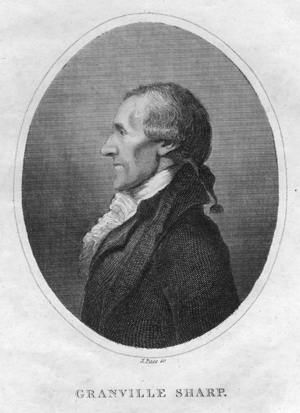Americans make movies about slavery and its abolition. In the past two years we’ve seen the Oscar-winning Twelve Years a Slave, based on a 19th-century slave narrative, and Django Unchained, with Christoph Waltz as a bounty-hunter who, uniquely among bounty-hunters of the period, did not make his living from capturing fugitive slaves. Spielberg’s Lincoln was about the Great Emancipator himself, as was the less historically rigorous Abraham Lincoln: Vampire Hunter.
But the abolition of slavery in England has never received the same attention. Perhaps it is because abolition here came not through blood and glory, but through the common law; or perhaps because emancipation does not frame constitutional debates here in the same way it does in the States. (Both sides in the abortion wars think that they are the North in that analogy, whether it’s Justice Scalia comparing Roe v. Wade to Dred Scott, the case that found laws prohibiting slavery unconstitutional, or Steven Spielberg getting the judge who wrote Roe v. Wade to play the judge who freed some slaves in Amistad.)
But this week the film Belle opens, which focuses on the curious fact that the judge who effectively abolished slavery in England, Lord Mansfield, shared his house with Dido Elizabeth Belle, the mixed-race daughter of his nephew and a Spanish slave. The film probably overplays Dido’s part in his decisions: contemporary gossip among slaveholders was that Mansfield was biased against them because of her, but we have no evidence that the abolitionists even knew of her existence. It also conflates two cases which came before Mansfield as Lord Chief Justice, taking the facts from the Zong — a slave-ship which threw 133 slaves overboard to conserve supplies, then made a claim for their loss on their insurance — and the decision, almost word-for-word, from the case of the slave James Somersett. This conflation is perfectly understandable, as Mansfield did not actually come to a decision in the Zong case; in fact, he tried very hard never to come to a decision on slavery. He did liberate slaves on a case-by-case basis, when the purported owner could not provide a bill of sale; it was only in Somersett’s case, in 1772, that he had to choose between a slave and an owner who had actually kept the receipts.
His opponent was not the radical young lawyer of the film, the 18th-century equivalent of a junior at Matrix Chambers, but Granville Sharp — grandson of a High-Church archbishop, nephew of a Tory MP, and a man who vigorously denied ‘the odious charge of innovation’. Sharp believed that it was slavery that was the innovation, entirely contrary to centuries of English common law, and that a writ of habeas corpus, the ancient writ by which the King can inquire why the liberty of one of his subjects is being curtailed, could be used to free any slave held in England. Lord Mansfield — more reluctantly than the film suggests — agreed. With that, he set a precedent: the air of England was, from then on, too pure for any slave to breathe.
This story is not as well known as it ought to be. (I once heard David Cameron make a speech about the British abolitionist movement and fail to mention Granville Sharp at all.) One reason may be the uncertainty as to what the judgment really meant — even Lord Mansfield was unsure, arguing at one point that it automatically liberated the 15,000 slaves in England, at another that it only prevented them from being sent to the West Indies. But the exact meaning did not matter: the case established that a bill of sale was no defence to habeas corpus, and so there was a procedure by which all slaves could be liberated. Abstract statements of rights are not as important as having legal remedies, founded on centuries of precedent, in guaranteeing a subject’s liberty. (There is no reason why abolition should not frame constitutional debates here.)
The narrow interpretation of Somersett’s case was particularly popular among historians who wished to downplay British abolitionism, often for political reasons — Dr Eric Williams, the first prime minister of Trinidad and Tobago, argued that slavery ended for economic rather than humanitarian reasons. The same revisionism happened in America, with arguments that the Civil War had been fought solely for economic reasons. But where US opinion, both popular and academic, has now swung back to view the Civil War as being ‘about’ slavery, Britain still seems stuck in the mindset of colonial guilt.
Take the Emancipation Proclamation. When the original document, signed by Lincoln, went on tour in 1947, more than three million Americans went to see it; millions more stood by the railroad to watch the ‘Freedom Train’ pass. It travelled 35,779 miles, visiting every state in the Union and stopping in most major cities. (It avoided Birmingham, Alabama — the organisers considered, rightly, that it would have been tactless to have to enforce segregation.) It is now kept in the National Archives, and when it is shown (on only three or four days a year, due to its fragility), American patriots queue for hours to see the glass case in which it is kept.
And what of the original writ of habeas corpus in Somersett’s case? It is not kept under glass; people do not queue to see it; it has never travelled the country on Network Rail. If you go to the Archives in Kew, presenting your driving licence and a utility bill, you will be allowed in to an upstairs room; if you then ask for box KB16/17, you will be handed a large cardboard box, containing a whole bunch of 18th-century parchments placed hugger-mugger inside; if you rummage through these parchments you will find, and you can hold in your hands, the document that freed every slave in England.






Comments